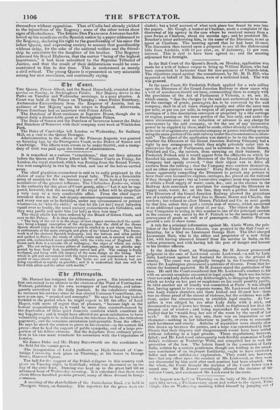the „Metropolis.
Mr. Harmer has resigned the Aldermauic gown. His intention was first announced in an address to the electors of the Ward of Farringdon- Without, published in his own newspaper of last Sunday, and subse- quently advertised in the daily journals. In the valedictory address, he recounts his services since he was elected Common Councilman, six-
teen years ago, " unasked and unsought." He says he had long looked forward to the period when he might expect to fill the office of Lord Mayor, with snore of regret than of pleasure, " because high as the honour unquestionably is, it would be more than counterbalanced by the deprivation of those quiet domestic comforts which constitute all my happiness ; and it would have afforded me great satisfaction to have
voluntarily sought to be relieved from the laborious duties, the ridiculous pageantry, and the senseless ostentation indispensable from the office."
Ile says he stood the contest to prove to his enemies—as the contest did prove—that he had the support of public sympathy, and of a large pro- portion of his fellow-citizens. But the departure from ordinary prece- dent in his case must terminate his connexion with the Corporation of London.
Sir James Duke and Mr. Henry Butterworth are the candidates in the field for the vacant gown.
The inauguration of Lord Lyndhurst, as High-Steward of Cam- bridge University, took place on Thursday, at his house in George Street, I lanover Square.
Tile ball for the support of the Polish refugees in this country took place on Tuesday night, in Cimidhslt; which was decorated as on the day of the civic feast. Dancing was kept up in the great ball till an advanced hour of Wednesday morning. It is calculated that there were about fifteen hundred persons present, many of them dressed in fancy- costumes.
A meeting of' the shareholders of the Australasian Bank was held in loorgate Street, on Saturday. The reporters for the press were ex-
eluded ; but a brief account of what took place has found its way into the papers. Mr. Gough, a banker at Chatham, made a complaint of the disavowal of his agency in the case where he received money from a poor Swiss at Chatham, about six months ago ; and he produced Mr. Boucher's letter authorizing him, in the name of the Directors, to act as agent at Chatham. The meeting agreed that he had been ill-used. The discussion then turned upon a proposal to pay all the dishonoured bills from Adelaide, with 10 per cent., or, if necessary, 15 per cent. interest. This is said to have been agreed to; and the meeting adjourned for a fortnight.


























 Previous page
Previous page